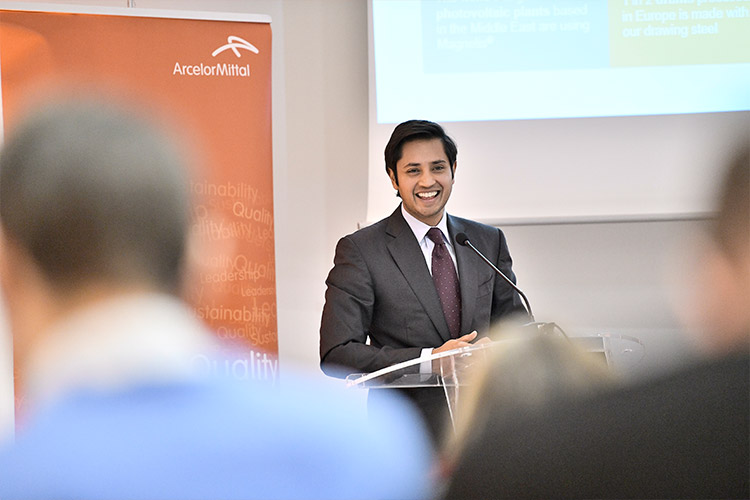Despite registering a fourth-quarter 2022 operating loss and a $1.03 billion impairment from its Ukraine assets, ArcelorMittal CEO Aditya Mittal said Feb. 9 that in 2022 the steelmaker made “clear progress” on its strategic decarbonization and growth priorities and was upbeat on expectations for improved market prospects for 2023.
“Overall the worst is behind us…we have a constructive outlook for 2023,” Mittal told analysts on a conference call to discuss full-year and Q4 2022 financial results. “We expect that, in Q1 and ahead, the business will perform better: we see good developments on the real demand side.”
ArcelorMittal registered an operating loss of $306 million in Q4, down from an operating profit of $4.56 billion for the same period in 2021. For 2022, operating profits fell to $10.27 billion from $16.97 billion a year earlier.
Sales revenue for the year grew to $79.84 billion from $76.57 billion in 2021, because of a spate of high prices as markets reacted to fears of tightness in certain products in the weeks following Russia’s Feb. 24 invasion of Ukraine before falling back.
Order books now up
The company expects overall orders to grow 5-6% this year, on the back of stronger markets, particularly in Brazil and NAFTA, where the company is expanding production. This would exceed expectations for overall apparent global steel demand growth of some 2%-3% this year.
While the headwinds of an unresolved situation in Ukraine and tightening monetary conditions globally continue to pose challenges, the direct impact of high energy prices has eased, with energy prices notably lower than in periods of 2022, it said.
“Energy costs in Europe continue to come down and normalize and this is helpful for order books, we expect orders to increase in all segments in Q1,” CFO Genuino Christino said on the call. “Prices have started to move up quite significantly so this looks good for Q2, and we expect costs to continue to come down: we won’t see such an impact from costs in the coming year… we’re cautiously optimistic.”
Platts assessed domestic prices for hot-rolled coil in Northwest Europe at Eur765/mt EXW Ruhr Feb. 8, up Eur5, amid positive sentiment on reports of mills’ strengthening order books.
Steel product destocking, which dominated markets in Q4, is no longer such a problem, Christino said.
“It’s hard to say the destock is over but it’s certainly less severe than in Q4,” the CFO told analysts. “Europe’s not so bad… in terms of real demand we were close to breakeven at the end of the year in Europe, even slightly positive.”
The intensity of the last quarter’s destocking was greater in Europe than in the US and was also more intense in flat products than in long products or tubular goods, Christino said.
In the auto industry, a key flat products consumer, second-half 2022 was “relatively good” in Europe, after a “very bad” H1, with a similar production improvement seen in NAFTA, the CFO said. “We will continue to see progress: we’re looking at a range of 5% increase in auto production in 2023.”
Furnace capacity “available”
In Europe, where ArcelorMittal took some blast furnaces offline last year amid weak demand, the company now intends to bring production back in response to improvements seen in order books, according to the executives.
“In Q4, we had some furnaces brought down for maintenance and now they’re up and running,” Mittal said. “We only have one small furnace in Dunkirk which is down and is near the end of its life which we may or may not bring back….. all the other capacity remains available for the group,” Mittal told the analysts.
In Ukraine, ArcelorMittal is currently operating at around 15-20% capacity at its Kryviy Rih steelworks and at 20-25% capacity at its iron ore mines in the country, the executives said.
The focus is to maintain the integrated Ukraine assets operational so that they still have the opportunity to produce in the future and participate in the country’s reconstruction, they said.
Strategic projects
Some of ArcelorMittal’s new projects combine both decarbonization and growth as the company progresses with plans to reduce the carbon intensity of its global production by 25% by 2030. Last year, it acquired a hot briquetted iron plant in Texas to provide metallics for low-carbon steelmaking, inaugurated a carbon capture and re-use project in Belgium, acquired four European scrap companies, boosted capacity at its major joint venture Indian steelmaking operation, acquired the CSP steel slab mill in Brazil and started ramping up a new 2.5 million mt/year hot strip mill in Mexico, among other projects.
It has received approval for a decarbonization project in Canada and is awaiting approvals for four decarbonization projects in the European Union, expected to be granted within a few months, Mittal said.
The company is meanwhile “quite pleased with the evolution” of its hot strip mill project in Mexico, which is currently running at a 50% run rate and should eventually provide up to $250 million worth of additional EBITDA, Mittal said.
— Diana Kinch






